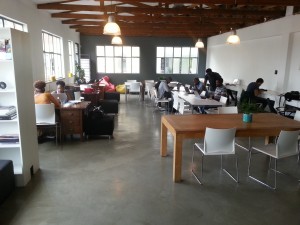
Indy Hall is a coworking community in Philadelphia, Pennsylvania, USA that we started in 2006. That makes us one of the longest-running spaces in the world.
If we’re “famous” for anything, it’s our relentless focus on community. At the heart of Indy Hall, you’ll find great people having authentic and meaningful experiences. We are living – and working – the good life.
We believe in sharing the good life & actively working towards it together.
I started Indy Hall because I was lonely. I didn’t so much need a place to work as I needed people to work around.
I’d quit my job as a web developer to freelance, and found that freedom and flexibility of being independent was awesome but DAMN it was lonely.
It seemed easier to find like-minded people anywhere except in my own city. So I spent nearly a year looking for those people. As I found them – I realized that many of us had the same problem in that it was difficult to find other people who had the same interests and passions we did.
By the time we were actually considering opening a coworking space, it was less like opening an office and more like building a village. The community we’d already built was invested in having a place to gather and work and meet and learn and explore.
I didn’t start Indy Hall for the community, I started it with the community.
One of the worst things I could do is show up in Africa and say “Here’s how we built our coworking space in Philadelphia. Do it our way!”
Coworking is an incredibly local experience. Indy Hall’s experience is the way that it is because we started in Philadelphia. The city’s local culture and DNA is baked in. I think that’s what makes us, us.
When I see new coworking spaces simply copying what they see in other coworking spaces from different places, I know they’re setting themselves up for failure. This happens very often in the US, and I’m seeing it more and more around the world as people try to copy the “visible” elements without understanding why they’re there in the first place.
I’m most excited for two things about coworking in Africa: the first is to discover the differences in our cultures that will make coworking in Africa unique. But the second is to discover the similarities, the basic human elements that we all share.
I’m coming to share, but I’m also coming to learn.
My personal philosophy on collaborations is also at the heart of Indy Hall’s success: true collaborations start on the foundation of a trusting relationship, not a transaction. Said more simply, we need to get to know each other before we work together.
So right now, I think we need to focus on truly getting to know each other. And then…the kinds of international collaborations that people crave will become not only more possible, but natural and effortless.
Over the last year, more of the people who join my list Coworking Weekly have introduced themselves from somewhere in Africa. It has been amazing, and exciting, to meet them and learn what’s happening in their cities, towns, and villages.
Villages. I want to know what coworking in villages is like!
This is a pioneering conference for a region. Not just a region, but an entire continent. That’s incredible, and I’m honored to be able to be a part of it.
Every time I’ve been to an event like this, I’ve gotten to see people who never would’ve otherwise found each other meet for the first time. That experience is truly magical, to find your tribe. It’s the same kind of thing that a great coworking experience can provide…except compressed into a couple of days full of gathering and working and meeting and learning and exploring.
Last week, the prestigious british weekly The Economist issued an article on the rapid expansion of coworking in Africa.

JoziHub, Johannesburg
« While coworking spaces are heralded in the rich world as trendy, open spaces conducive to networking and brainstorming, in Africa they serve a far more practical purpose: coworking spaces mitigate the exorbitant costs of setting up and running an office », writes the magazine.
This is indeed a statement that we share, as coworking Africa conference’s organizers. Maybe, nowhere in the world is coworking more important than in Africa to let the middle class of digital savvy workers, freelancers and entrepreneurs rise up.
In 2014, Luanda (Angola) and N’Djamena (Chad), according to Forbes magazine, were the most expensive cities in the world with respect to the cost of living, ahead of Tokyo, London or Geneva. Victoria (in the Seychelles Islands) Libreville (Gabon) and Kinshasa (DRC) are also in the top 20 of the worlds most expensive cities as well.
The lack of proper infrastructures added to a rapid economical growth feeding demand for good quality offices, lands and goods, is an explanation of the rising disconnection between the average revenue per person in Africa and the cost of living in major cities.
Although too slowly, as opposed to other emerging areas, education in many African countries is improving. So is internet access and digital services provision. As more than 50% of the African population is under 20 years old, a huge skilled workforce is arising which will need places, convenient work environments, connectivity, meeting areas, informal learning and networking opportunities… The challenge is enormous.
Here comes coworking.
Mutualized community based infrastructures such as coworking spaces can provide them with a more affordable solution compared to what they are charged for an isolated office. In addition, coworking allows to split the cost of a generator or of a bandwidth capacity, a critical point in Africa, where power outages and bandwidth scarcity might impede the development of new businesses.
This is the reason why coworking could emerge as a must for modern digital and creative professionals in Africa as it does in Hong Kong, London, Paris, Barcelona or New York City.
As a matter of fact, these cities are steadily transforming themselves into coworking villages. Coworking has been acknowledged as one of the workplace models of the 21st century, where values such as positive social interactions, openness and serendipity are gaining ground.
As far as we are, though, in Africa, the growth of coworking spaces is mainly fueled by the mushrooming of tech hubs all over the continent.
According to the World Bank, close to 100 tech hubs are in operation across Africa. Have a look at this map of African tech hubs produced by Fab Foundation and Bongo Hive, in Zambia.
Thanks to these tech hub communities, Lagos, Nairobi, Cape Town and more are giving birth to a breed of great startups, in the mobile and web industries.
But what are Tech Hubs if not « dedicated coworking spaces » ?
This new tech hub IBM plans to open up soon in Johannesburg, for instance, will be built around a coworking space. So is KLab, in Kigali, and many more we could mention.
So, community based tech hubs are definitely part of the coworking family.
Industry wise, coworking spaces are sprouting in many different fields. The international network Impact Hub for instance, devoted to social entrepreneurs, has wide ambitions in Africa, with spaces soon to be opened in more than ten African countries, like here below in Accra.
Impact Hub Accra from John-Paul Parmigiani on Vimeo.
Coworking spaces put themselves also at crossroads. Between artists, designers and digital entrepreneurs, for instance. Take BongoHive, in Zambia.
« BongoHive is building connections between its new community and other communities, illustrates this blog supported by Cisco. It is now working with Zambian artists and photographers to build websites for them to showcase and sell their work. »
Vertically (focused) or horizontally (general) oriented, business or social minded, coworking spaces are blossoming in every directions in Africa, as it is elsewhere in the world. That said, whether they are tech hubs, vertically focused or stand alone spaces open to digitally enabled professionals, a coworking boom in a city is the evidence of a healthy growing ecosystem dynamic.
Startups and companies need skilled and creative workers, business savvy individuals, HR, law and marketing experts, around them to fuel their development. Coders are not enough.
From that perspective, Africa is not different than any other continent : the more coworking spaces communities you have, the better off your country will be !
Jean-Yves Huwart
Initiator of the Coworking Europe and Coworking Africa conferences